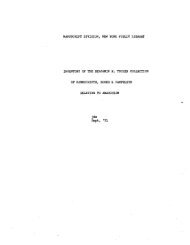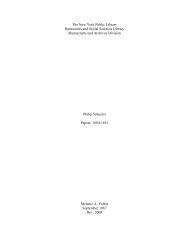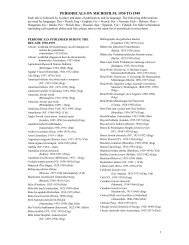pdf available - Multiple Choices
pdf available - Multiple Choices
pdf available - Multiple Choices
Create successful ePaper yourself
Turn your PDF publications into a flip-book with our unique Google optimized e-Paper software.
234 LUBOML<br />
soldiers made a rush upon them to buy whatever<br />
they could find. Every piece of merchandise,<br />
shop-worn because it had been lying idle for<br />
many years, was sold for Soviet rubles and Polish<br />
zlotys; and nothing, not a piece of junk, was left.<br />
The shopkeepers were raking in so many<br />
rubles and zlotys that they did not know what to<br />
do with them; but when they tried to buy new<br />
merchandise with this money, they could not buy<br />
anything with it. When they saw the trap into<br />
which they had fallen, they stopped selling and<br />
began to hoard whatever goods they had.<br />
I myself was afraid to go near my brick works.<br />
True, the building was not my own; I only rented<br />
it. But, according to the Soviet interpretation, I<br />
too would have been called an exploiter. The new<br />
authorities quartered the officers and their civilian<br />
staff in the homes of the townspeople, big<br />
homes that had a lot of rooms. The owners were<br />
distressed at having to squeeze themselves into<br />
one or two rooms. Moreover, the army nationalized<br />
some of the enterprises and made the former<br />
owners work for the authorities as simple workers.<br />
We were gloomy. Merchants and rich men<br />
feared being sent to Siberia as bourgeois and exploiters.<br />
I was afraid to go to the brick factory that<br />
I was renting. The factory had finished bricks that<br />
I had made myself. Later I sold them to the military<br />
for very little money.<br />
Still later I, like some others, became a government<br />
worker in a lumber yard that provided<br />
lumber for the lyespromchoz [the government<br />
forest products] as well as for the military staff in<br />
the shtetl.<br />
I postponed my own private plans, knowing<br />
that there was no chance for them to materialize,<br />
as we were facing an abyss.<br />
Our hearts were heavy, and this was expressed<br />
in all kinds of rumors, one worse than<br />
the other. The rumors turned into realities very<br />
suddenly, when 500 of our youth were drafted.<br />
Some of them joined the army at once and others<br />
were sent to build aerodromes, dig trenches<br />
and the like. That which we feared came sooner<br />
than we thought.<br />
Early Sunday morning, June 22, 1941, bombs<br />
began to fall on the shtetl. A bomb exploded not far<br />
from us, destroying the post office. Shrapnel was<br />
flying into the homes. Not far from us lived the<br />
shoemaker Sender and his wife, and the two of<br />
them became the first victims of this first air<br />
attack.<br />
Sunday at 10 a.m., I was drafted with many<br />
other townsmen. Our priyom [induction] took<br />
place in the home of Veytsfrucht. Somehow I<br />
managed to make a quick visit home. When my<br />
wife and family saw me, they fell upon my neck<br />
nearly strangling me; I felt that if I did not free<br />
myself from them, I would faint right then and<br />
there. I do not remember who tore me away from<br />
them almost by force. This was the last time that I<br />
saw them!<br />
They sent me to the stationme and many<br />
others from the town, including some of my<br />
neighbors. There we found some newly erected<br />
barracks; we were provided with some provisions,<br />
including biscuits, saccharin and sugar. I<br />
was assigned to the artillery because of my previous<br />
experience.<br />
The officer in charge immediately let us know<br />
that the merzavtsy [German bastards] had attacked<br />
us first: we had given them bread and they<br />
had thanked us by casting stones at us. "But don't<br />
worry, rebyata [kids]," he consoled us. "Pobyeda<br />
budet za nami [victory shall be ours'!"<br />
We went straight to the Shatsk area near the<br />
lake. As we found out later we were already<br />
surrounded, so that instead of fighting a war, we<br />
had to seek a way out of the trap to save our lives.<br />
We set out over highways and byways and<br />
unknown routes, in the general direction of Kovel,<br />
marching night and day, whenever we saw an<br />
opening to do so, only to get further away from the<br />
deadly bombardment that the Germans had directed<br />
at us.<br />
During these first days I had experienced<br />
great terror and dread, seeing and living through<br />
a great many things. While we were in Shatsk, a<br />
part of our company was sent nearer to the front.<br />
As I was walking, I noticed someone near me look<br />
around and run away. It was my friend Avrom<br />
Melnik. Later, when the company returned from<br />
its foray, an officer came toward me on his horse,<br />
took out his revolver, and wanted to shoot me,<br />
thinking I was the deserter Melnik. Luckily, the<br />
men in my company took my part and proved to<br />
him that I was not the deserter, but one of them.







